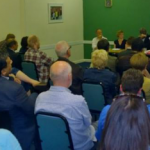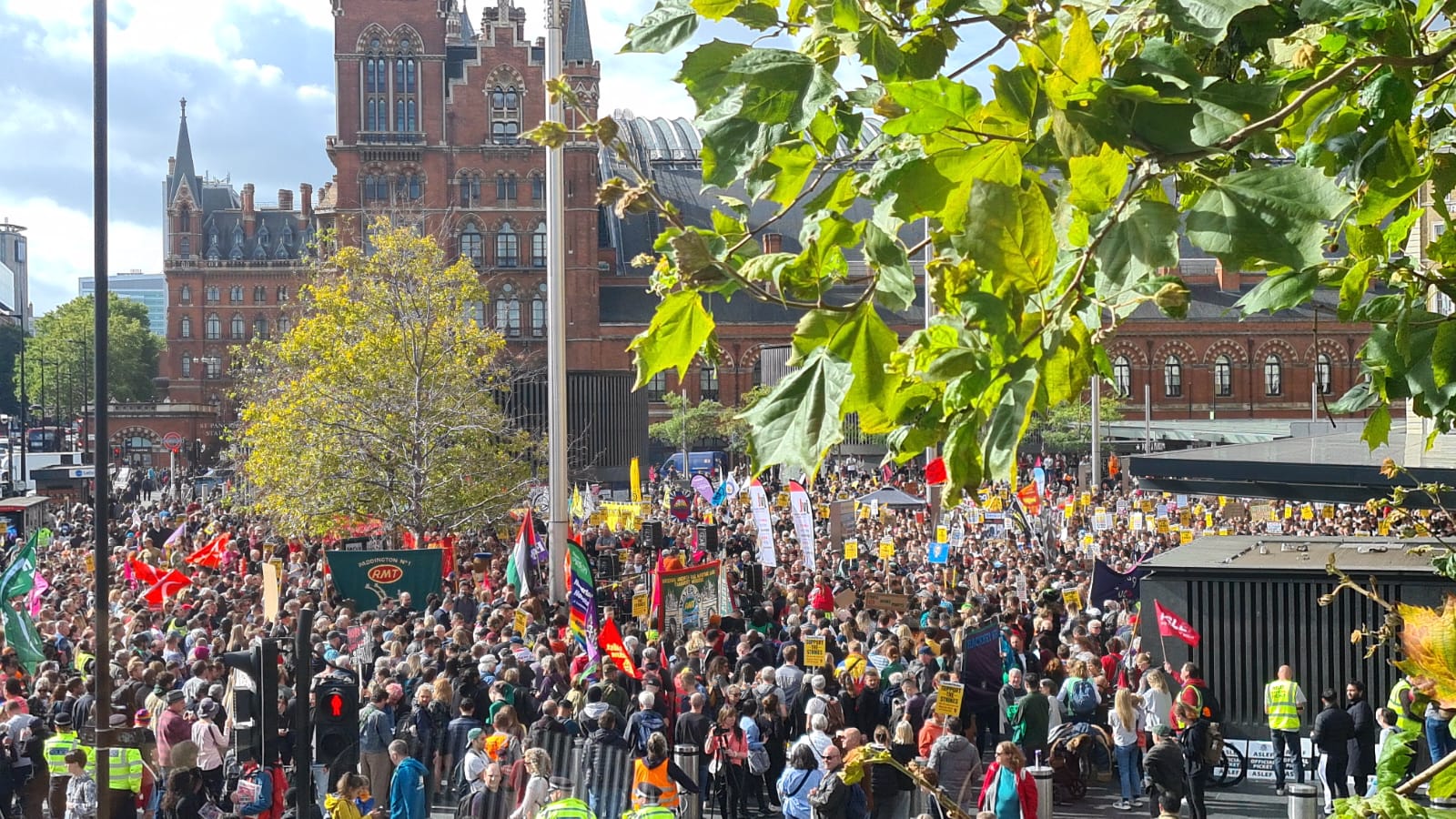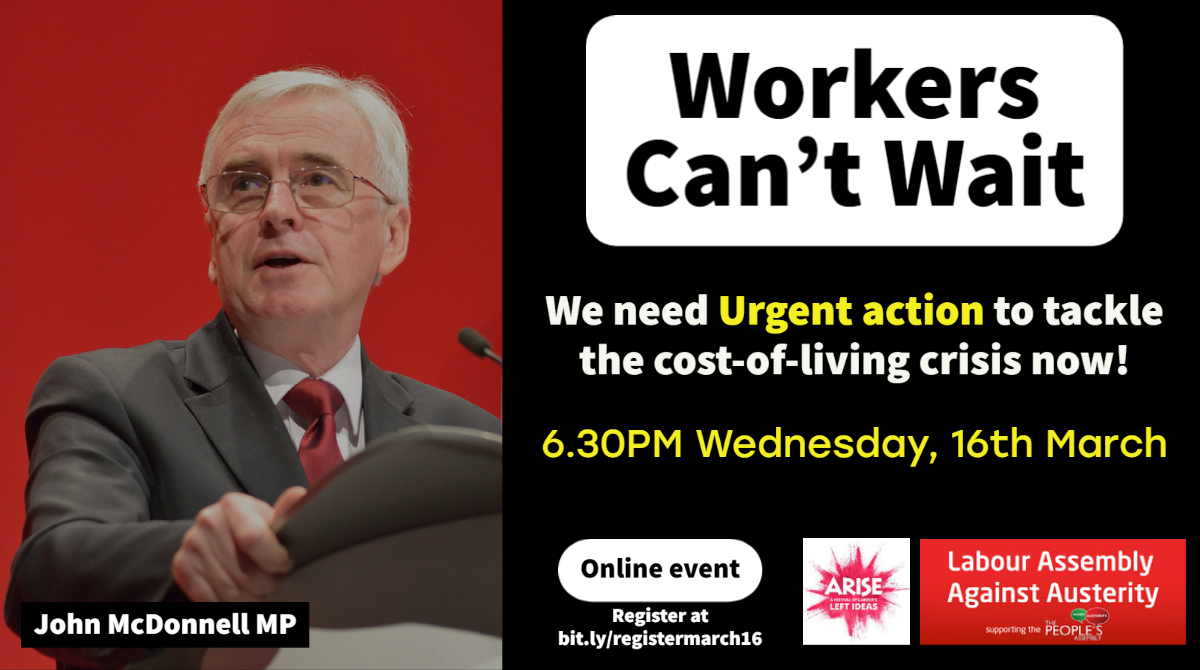 The launch of Sheffield Labour Assembly Against Austerity saw nearly seventy members from across the city join a lively debate on ‘Opposing austerity and stagnation – priorities for Labour after the election.’
The launch of Sheffield Labour Assembly Against Austerity saw nearly seventy members from across the city join a lively debate on ‘Opposing austerity and stagnation – priorities for Labour after the election.’
John Campbell from UNISON Sheffield Teaching Hospitals chaired the meeting. The other speakers were Louise Haigh MP, Paul Blomfield MP, Cllr Olivia Blake and the economist Mick Burke.
All the speakers emphasised the importance of Labour developing a rigorous and clear alternative to the failed policy of austerity and its disastrous effects on the majority of the country. They shared the view that, after 2008, the Labour Party had failed to win the debate that the deficit was not caused by Labour overspending, but mainly by the Crash and the collapse in tax receipts. Speakers also emphasised the importance of increasing investment and ending corporate welfare.
Contributors from the floor highlighted their frustration that Labour was disarmed in its attempt to expose the failure of the Tories’ economic policy, because it had not provided a coherent alternative to austerity. A number of people also emphasised that the creation of an alternative to austerity was the responsibility of the whole labour movement. Further, the Party needs persuasive and clear answers in its campaign messages.
It was recognised that we need much more discussion on opposing austerity and its repercussions on wider economic and social policies. The debate also featured contributions on the decline in investment, defence spending, poverty, the uneven impact of austerity on women and BME communities, the living wage, insecurity at work, problems facing students & young people, re nationalisation of the railways and other monopolies, housing and cuts in local council budgets. Future Labour Assembly Against Austerity meetings will discuss these points.
Following the meeting the scale of the task we face became greater. The vote for the Second Reading of Osborne’s £12bn austerity budget assault was swiftly followed by an announcement of billions of more cuts to follow, alongside a commitment to fix Britain’s defence spending at 2%.
The Tory attempt to create an irreversible redistribution of wealth and power in our society in favour of a small minority forces the labour movement in general, and the Labour Party in particular, to create a credible economic alternative which is supported by the majority of the country. Sheffield Labour Assembly Against Austerity can make a small but significant contribution to that goal.
Our speakers have kindly provided brief summaries for supporters of Sheffield Labour Assembly Against Austerity who were unable to make the meeting and as a pointer for future discussions.
John Campbell, UNISON, said:
“If you were an alien and had just landed on Earth you could be forgiven for thinking that the economy is booming and that we were back in profit and everybody had a great standard of living. The truth is far more painful for millions of people.
So called new jobs are low paid, part time or zero hours and those on workfare are deleted from those jobless figures and counted as employed.
The impact on women of austerity has perhaps been more severe. There has been a rise in the number of women who are stuck on zero hours contracts who won’t complain for fear they might lose their job. Women make up the majority of those who are being paid less than the living wage, with more than ever before in part time work. Single mothers are facing a greater obligation to look for for work or risk having their benefits taken away or sanctioned.
We also have the senseless situation where people in work have to rely on benefits and other handouts because their bosses won’t pay a living wage.
Growing inequality is fast becoming the legacy of this Government and no amount of talking up the economy can hide it. The rich are allowed to get richer at the expense of the poor.
Our job is to make the Labour Party stand up for ordinary people; our people. What they need to hear is there is an alternative.”
Mick Burke, economist and LAAA supporter, said:
“The answer to austerity is investment. Without it, only low-paid and often low-skills jobs can be created and as we have recently seen, even these will be cut if wages so much as edge higher.” He added, “There are the resources there for investment. There is £93 billion in corporate welfare each year, subsidies, incentives and guarantees to the private companies which is greater than the total deficit of £83 billion. In addition, we could go back to something radical on taxation, maybe the end of the Thatcher period when the high rate income tax was 60p, Corporation Tax was 34% and Capital Gains Tax was 40%. From these two sources there is plenty of money to end austerity and to fund state-led investment.”
Paul Blomfield MP said:
“We need to recognise that the reasons for defeat on 8 May were complex and won’t be resolved by a simple binary choice of moving to the right or left. We have to understand why we could we could increase our vote share massively in Sheffield Central, while 30 miles away we lost our voters in traditional Labour areas to the Tories and UKIP. A starting point is to look to our recent experience of power and opposition. The last Labour Government rebuilt the broken country we inherited from the Tories in 1997 – transforming our hospitals and schools, introducing the minimum wage, and much more. Under Ed Miliband we recognised the need to go further, challenging growing inequality and rehabilitating the role of the state – intervening to build an economy that works for everybody, with an effective industrial strategy, and protecting people from an unregulated labour market. And we need to reverse Thatcher’s legacy on tax, because we will all need to make a bigger contribution to provide the health, social care and public services we want for the future. These are tough questions, but only Labour can provide the right answers.”
Louise Haigh MP said:
“The Sheffield meeting marked an important step towards challenging the Tories’ dominant narrative that only a ruthless cuts agenda to reducing the deficit is possible. The labour movement must unite, challenge and educate on the alternative to this Government’s ‘austerity’ agenda by showing that we can change our economy and its structural flaws so that everyone can share in growth. Economic credibility is about so much more than spending or cutting – the Left needs to put forward our own ‘long-term economic plan’ that reforms the financial sector, rebalances the economy and creates the high-skilled green jobs of the future we will need to generate growth.”
Cllr Olivia Blake said:
“The first ‘Labour assembly against austerity’ event in Sheffield [has] allowed members from across the city to come together to discuss the biggest issue we face as a party. That is to build a successful alternative narrative and programme not only to take us forward to 2020 general election but to address the challenges of our changing economy for future generations.”



0 Comments